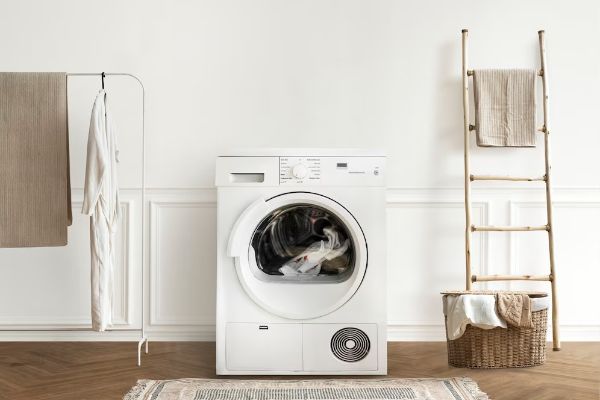High-efficiency washing machines have gained popularity in recent years due to their advanced features and potential energy and water savings. If you’re considering upgrading to a high-efficiency washing machine, it’s crucial to understand the pros and cons.
In this blog post, we will explore the advantages and drawbacks of high-efficiency washing machines, helping you make an informed decision for your laundry needs.
Table of Contents
Pros of High-Efficiency Washing Machines
Energy Efficiency
One of the primary advantages of high-efficiency washing machines is their energy efficiency. These machines are designed to use less energy compared to traditional top-loaders, resulting in reduced electricity consumption and potential cost savings on utility bills. Energy Star certified models are particularly efficient and environmentally friendly.
Water Efficiency
High-efficiency washing machines are also known for their water-saving capabilities. These machines utilize advanced technologies, such as sensors and load detection, to optimize water usage based on the size of the laundry load. They typically require less water per cycle, making them an eco-friendly choice.
Gentle on Clothes
High-efficiency washers generally employ gentle washing motions and special drum designs, such as front-loading or impeller systems, to protect and prolong the lifespan of your clothes. The reduced agitation and tumbling action minimize wear and tear on fabrics, keeping them in better condition for longer.
Increased Capacity
Many high-efficiency washing machines offer larger load capacities, allowing you to wash more laundry in a single cycle. This is beneficial for individuals or families with larger households or those who frequently have larger loads. The increased capacity can save time and reduce the number of loads required.
Advanced Features and Customization
High-efficiency washing machines often come equipped with advanced features and customization options. These may include adjustable wash settings, programmable cycles, delayed start, steam cleaning, and stain removal functions. These additional features provide greater flexibility and convenience in tailoring your laundry routine.
Cons of High-Efficiency Washing Machines
Higher Initial Cost
Compared to traditional top-loaders, high-efficiency washing machines generally have a higher upfront cost. The advanced technologies and energy-saving features contribute to the increased price tag. However, it’s important to consider the potential long-term savings on energy and water bills to determine the overall cost-effectiveness.
Longer Cycle Times
High-efficiency washers often have longer cycle times compared to traditional machines. This is because they utilize different washing and rinsing techniques, such as tumbling or cascading, to conserve water. While this can lead to more efficient cleaning, it may require more time for completing a full wash cycle.
Learning Curve
Operating a high-efficiency washing machine may require a slight learning curve, especially if you’re accustomed to traditional machines. The control panel, settings, and maintenance requirements may differ, and it may take some time to familiarize yourself with the new features and optimize the machine’s performance.
Potential for Odors and Mildew
Front-loading high-efficiency washing machines are susceptible to developing odors and mildew if not properly maintained. The airtight seal and moisture retention in the drum can create a breeding ground for bacteria. Regular cleaning and leaving the door open between cycles can help mitigate this issue.
Pros and Cons of High-Efficiency Washing Machines
| Pros | Cons |
|---|---|
| Energy Efficiency | Higher Initial Cost |
| Water Efficiency | Longer Cycle Times |
| Gentle on Clothes | Learning Curve |
| Increased Capacity | Potential for Odors and Mildew |
| Advanced Features and Customization |
Conclusion
High-efficiency washing machines offer numerous benefits, including energy and water efficiency, gentler treatment of clothes, increased capacity, and advanced features. However, they also come with considerations such as higher initial cost, longer cycle times, a learning curve, and potential odor or mildew concerns. Assess your specific needs, budget, and laundry preferences to determine if the advantages outweigh the potential drawbacks for you.
Research different models, compare energy efficiency ratings, and read customer reviews and recommendations to find the high-efficiency washing machine that best suits your needs. Consider factors such as load capacity, available space, desired features, and budget.
When purchasing a high-efficiency washing machine, look for the Energy Star label, which signifies the appliance’s energy efficiency and environmental friendliness. This certification ensures that the machine meets or exceeds rigorous standards set by the U.S. Environmental Protection Agency.
To make the most of your high-efficiency washing machine, follow these tips:
- Use the appropriate detergent: High-efficiency washers require low-sudsing detergents specifically designed for such machines. These detergents help optimize cleaning performance while minimizing excessive suds that can interfere with the machine’s efficiency.
- Sort your laundry: Like traditional washing machines, it’s important to sort your laundry based on color, fabric type, and care instructions. This helps ensure proper cleaning and prevents color bleeding or fabric damage.
- Load the machine correctly: Avoid overloading or underloading the machine. Follow the manufacturer’s guidelines for load capacity and distribute the laundry evenly inside the drum for efficient cleaning.
- Choose the right cycle: High-efficiency washers offer various wash cycles for different fabric types and soil levels. Select the appropriate cycle to achieve optimal cleaning results while conserving energy and water.
- Maintain the machine: Regularly clean the detergent dispenser, drum, and door seal to prevent the buildup of detergent residue, lint, and moisture. Leave the door ajar between cycles to allow air circulation and reduce the risk of odors or mildew.
By understanding the pros and cons of high-efficiency washing machines and implementing these tips, you can make an informed decision and maximize the benefits of this modern laundry appliance. Take into account your specific requirements, budget, and long-term energy savings to determine if a high-efficiency washing machine is the right choice for you. Embrace the efficiency and environmental consciousness of these machines and enjoy cleaner, more sustainable laundry for years to come.

